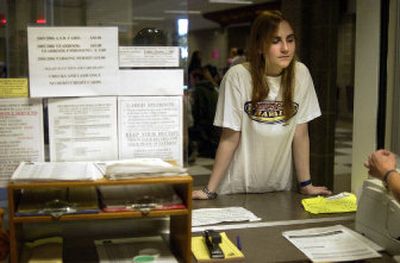Long-gone students on schools’ books

Student debt is not just for college graduates anymore.
As of last week, University High School students, past and present, owe $42,400 in outstanding fines and fees for things like damaged textbooks or unreturned library books, class fees not yet paid, parking tickets or lost uniforms. Central Valley High School has $26,217 in unpaid fines.
In the East Valley School District, students owe somewhere around $53,000, a district bookkeeper said.
“It goes back decades,” said East Valley High School Principal Jeff Miller.
In most school districts, unpaid fines and fees follow a student all the way from kindergarten to senior year.
A handwritten index card of old debts from the 1981-1982 school year shows one East Valley student having an unpaid metal shop fee of $1.75, and $6.65 for the replacement cost of an English book.
“We try to make sure that we are not a credit bureau,” Miller said. “But let’s say we have a kid who owes six bucks from his sixth-grade candy sale back in the 1970s. Because we’re public agency we have to keep those fees on the books, and we keep them on the books forever.”
While students can still graduate, East Valley and both Central Valley School District high schools withhold diplomas, grades, and won’t let a student turn out for sports or clubs if they have any outstanding fines and fees.
“Instead of a diploma, they get handed a bill,” said Paul Danelo, an assistant principal at U-Hi.
That’s also true for Spokane Public Schools.
“(Students) cannot get their diploma unless they have paid up,” said Terren Roloff, community relations director.
Under state law, schools can withhold the official transcripts of any student owing fines. The biggest offenders are not the students who are scheduled to graduate on time, but those who transfer out of the district never to be seen again, district officials agreed.
The law states that districts are required to forward a student’s permanent record, including records of disciplinary action or history of violent behavior, records for attendance, immunization, special education, and information on whether they passed or failed certain classes, but not an official transcript.
An official transcript is needed for students who go on to college.
“By allowing the schools to keep the transcript, they still have the incentive to pay the fee or fine,” said Emmett Arndt, executive director of teaching and learning for Spokane Public Schools.
Last week, the Central Valley School Board talked about not letting students participate in commencement ceremonies as another way to collect the debt. It cited a school board in Western Washington that took away that right of passage for students whose fees aren’t paid.
“The message is that the issuance of a high school diploma means a completion of all your obligations,” said Tracy Suchan Toothaker, the principal at Marysville (Wash.) Pilchuck High School. “And that also means financial obligations.”
Marysville students owed thousands of dollars in previous years, and last year the district collected more than 85 percent of the unpaid fines, Suchan Toothaker said.
“We were sending a mixed message when we still let kids walk across that stage,” Suchan Toothaker said. “Now you don’t even practice for graduation if you have unpaid fines, because even practicing indicates you are eligible.”
The amount of student debt will drastically go down around graduation time, when students line up to pay so they can receive a diploma and an official transcript. It goes back up each fall, when students return, and fines have been posted. This year’s freshman class at U-Hi brought with it $1,300 in unpaid fines.
It’s not surprising that some students may have trouble keeping up with their bills.
A Central Valley High School student can expect to write a check for $85 the first week of school, just to cover the costs of an activity card, a yearbook and a parking pass. That doesn’t include the costs associated with clubs and sports, and some classes that have fees associated with them for materials, such as art and photography.
Along with the $52 U-Hi junior Kristin Whitacre paid for uniforms and equipment to play soccer this year, she also had to pay $10 for an advanced placement chemistry book damaged by water last year, in order to turn out for the sport.
“It adds up quickly,” Whitacre said.
If a student cannot afford to pay an outstanding fine, most schools will arrange a payment schedule.
East Valley’s Miller said his school has collected as little as $5 a month from students in the past.
“Most people don’t want to have bad debt out there, and find a way to deal with it,” Miller said. “I think it’s important that they realize it’s not us collecting personal money, it’s us collecting a public debt that they owe; this is the taxpayers’ money that we are trying to collect, and we’re trying to be responsible.”